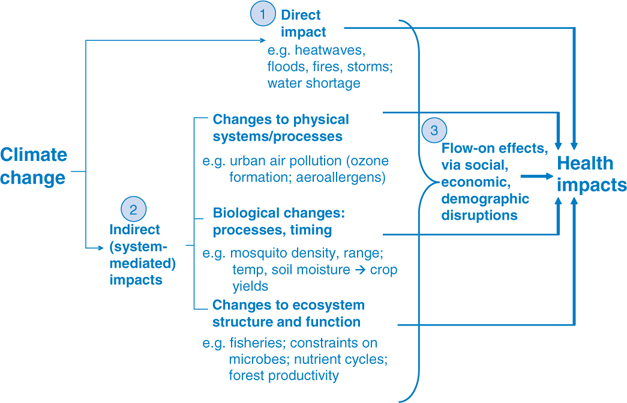Climate change: an emerging health issue
Anthony G. Capon A B and Elizabeth G. Hanna AA National Centre for Epidemiology and Population Health, Australian National University
B Corresponding author. Email: tony.capon@anu.edu.au
NSW Public Health Bulletin 20(2) 1-4 https://doi.org/10.1071/NB08068
Published: 25 February 2009
The core concern is succinctly stated: climate change endangers health in fundamental ways.
Dr Margaret Chan, Director-General, World Health Organization on the occasion of World Health Day 2008.
The World Health Organization chose climate change as the theme for last year’s World Health Day in an explicit attempt to attract policy-makers to the compelling evidence about the impacts of climate change on health. The reality of human-induced climate change can no longer be doubted, but the extent of its consequences for health can still be reduced. Consideration of the health impacts of climate change can enable political leaders to act with the required urgency.1
Figure 1 illustrates the many ways in which climate change will affect health.2 There are likely to be some (modest) positive health consequences from climate change (for example, reduced extreme cold weather events in some locations); however, climate change will mostly have negative impacts on health. Climate change will affect health by changing the frequency and distribution of existing health problems. The health impacts of climate change will be greater in low-income communities; those who have contributed least to climate change will be affected the most.3

|
Climate change is currently high on the public policy agenda in Australia and around the world. A vitally important aspect of climate change policy is the opportunity of co-benefits for health from both mitigation and adaptation actions – examples include eating less meat; using renewable energy sources that reduce air pollution; and active modes of transport.4 This positive story is expected to be presented at the United Nations conference on climate change in Copenhagen later in 2009.
Current actions
The New South Wales (NSW) Government recognises climate change as a serious environmental, economic and social threat. The challenges posed by climate change have informed the NSW Greenhouse Plan, the current State Plan and the forthcoming Climate Action Plan. Box 1 provides a perspective on climate change and the NSW health system.
The Australian Government recently established the National Climate Change Adaptation Research Facility (NCCARF) at Queensland’s Griffith University to generate information needed by decision-makers in government, and in vulnerable sectors and communities, to manage the risk of climate change impacts. A National Climate Change Adaptation Research Plan for Human Health has been published.5 This plan will inform the work of a research network on this theme (Box 2).
The papers in this issue
Kjellstrom and Weaver present a succinct overview of climate change and health in Australia. The paper encompasses current and future threats facing Australians, including extreme weather events (storms, floods, heat waves), impacts on worker productivity, water supplies, air quality, vector- and foodborne disease, and impacts on mental health.
There are two papers identifying co-benefits for health from climate change actions. Rissel discusses active travel as an approach to climate change mitigation (reducing carbon dioxide emissions from fossil fuel use in motorised transport) that also has myriad human health benefits. This paper outlines strategies for health and urban planners to increase cycling, and uses Australian examples to illustrate the co-benefits of active travel. Dixon and colleagues focus on co-benefits in the food system, examining the link between industrial food production and food problems such as diets poor in nutrients and loss of control over food choices. Climate change threatens further food shortages. The authors explain why promoting urban agriculture is sustainable and brings multiple health and environmental benefits.
Prolonged droughts over recent years in Australia have exacerbated bushfires and in 2003 NSW and Victoria experienced major bushfires and widespread smoke pollution. Kolbe and Gilchrist evaluate the effectiveness of public health advisories about bushfire smoke pollution provided to Albury residents in the summer of 2003.
In the concluding paper, Capon and colleagues argue for systems approaches in governance to address climate change. They argue for a focus on the underlying causes of problems such as climate change and the obesity epidemic. Effective governance will necessitate moving beyond ‘silo’ approaches to integrative policy and planning.
Climate change, an environmental health issue of unprecedented scale and complexity, necessitates new ways of thinking, communicating and acting for public health.4 We hope this special issue of the Bulletin will encourage public health workers to take on these challenges.
Box 3 contains a glossary of terms used in this issue that may be unfamiliar to Bulletin readers.
[1]
[2] McMichael AJ, Woodruff RE, Hales S. Climate change and human health: Present and future risks. Lancet 2006; 367 859–69.
| Crossref | GoogleScholarGoogle Scholar | PubMed | (Cited 12 December 2008)




